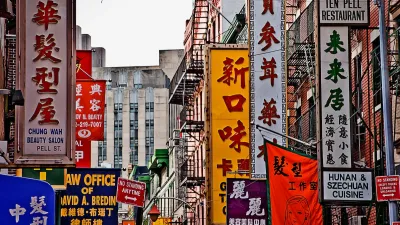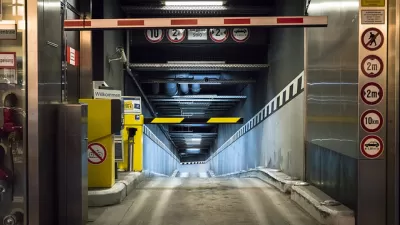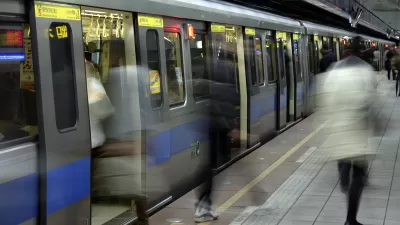With her Foodprint project, Nicola Twilley wondered what one could learn about a city by looking at it through the lens of food. In this piece on Urban Omnibus she shares what she's learned.
Through two events -- one in New York and another in Toronto -- Twilley and co-organizer Sarah Rich invited speakers and eperts to discuss how food shapes the urban environment and how urban policies can be improved to reshape the food systems that feed our cities.
"Many extraordinary and peculiar factoids, certainly: enough to keep us well-stocked at dinner parties for years to come. Toronto, for example, is the second largest urban food processing hub in North America (after Chicago) and its food factories still occasionally overwhelm certain neighborhoods with the smell of roasting coffee beans, freshly-slaughtered beef, or potato and leek soup. We also learned that turning just 10% of NYC's private backyards over to urban agriculture would produce 113 million lbs of vegetables each year, or enough to feed 700,000 people at current rates of consumption.
We have also confirmed one of the Foodprint Project's founding premises: the best food conversations are hyper-interdisciplinary. As Nevin Cohen, urban planner and panelist at Foodprint NYC, put it, "Food is a social justice issue and a public health issue; it's also an economic development issue, it's a transportation issue, it's a regional planning issue, it's an ecological issue." By inviting panelists whose work engages deeply with the city's food systems, but who come from widely differing perspectives - such as a First Nations fisherman, a food scientist working to redesign salt crystals, an architect using urban agriculture to retrofit ‘60s tower blocks, and the health official in charge of drafting Toronto's first city-wide food policy - we've created new connections, both personal and conceptual."
FULL STORY: Foodprint City

Alabama: Trump Terminates Settlements for Black Communities Harmed By Raw Sewage
Trump deemed the landmark civil rights agreement “illegal DEI and environmental justice policy.”

Study: Maui’s Plan to Convert Vacation Rentals to Long-Term Housing Could Cause Nearly $1 Billion Economic Loss
The plan would reduce visitor accommodation by 25% resulting in 1,900 jobs lost.

Planetizen Federal Action Tracker
A weekly monitor of how Trump’s orders and actions are impacting planners and planning in America.

Waymo Gets Permission to Map SF’s Market Street
If allowed to operate on the traffic-restricted street, Waymo’s autonomous taxis would have a leg up over ride-hailing competitors — and counter the city’s efforts to grow bike and pedestrian on the thoroughfare.

Parklet Symposium Highlights the Success of Shared Spaces
Parklets got a boost during the Covid-19 pandemic, when the concept was translated to outdoor dining programs that offered restaurants a lifeline during the shutdown.

Federal Homelessness Agency Places Entire Staff on Leave
The U.S. Interagency Council on Homelessness is the only federal agency dedicated to preventing and ending homelessness.
Urban Design for Planners 1: Software Tools
This six-course series explores essential urban design concepts using open source software and equips planners with the tools they need to participate fully in the urban design process.
Planning for Universal Design
Learn the tools for implementing Universal Design in planning regulations.
Caltrans
Smith Gee Studio
Institute for Housing and Urban Development Studies (IHS)
City of Grandview
Harvard GSD Executive Education
Toledo-Lucas County Plan Commissions
Salt Lake City
NYU Wagner Graduate School of Public Service





























